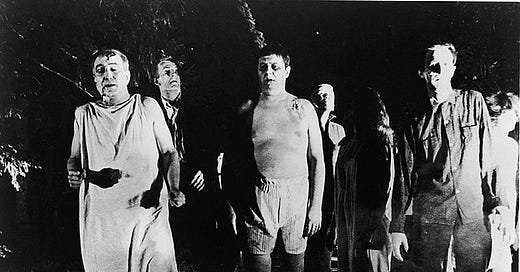Witches are ancient in the West, and so are ghosts, but zombies are not.
The enchantress Circe addled Odysseus’ men with her potions before touching them with a rhabdos, a wand—and there you have the necessary ingredients for witchcraft, a word whose roots are sunk deep in the soil of Old English. Athenodorus Cananites, tutor to the future Augustus Caesar, rented a haunted house in Athens and found himself distracted from his work by the spectral vision of a soul in chains.
Alarming as this no doubt was, it hardly broke with literary convention: when Circe sent Odysseus to the great river Ocean at the ends of the earth, he met the vanished shadows of the dead. Their bodies lay burned or buried, but on the outskirts of existence they endured as fleeting wisps of humanity—as ghosts.
The powers that animate the body may flow on, whether we like it or not, after the body collapses to the ground: this kind of story is natural to tell. Even when we see the flesh decompose into nothing, we still don’t feel as if all that we are has been exhausted. The leftover residue in our imagination is the ghost—a soul without a body.
But a body without a soul is something else entirely. According to Aristotle it’s not even a body, except incidentally as a manner of speaking: a severed hand isn’t a hand, not really—just the heap of sinew and bone that used to be a hand. The thing that makes us really us is the light of the mind, the organizing principle that makes us live. If you could somehow get your mind into another body, or siphon it off pure in astral form, it would still be you. But the body alone, de-souled, is a hunk of meat.
Or else it’s a zombie. The mindless corpse that lurches into motion after death is a nightmare from voodoo, the dizzying Haitian stew of Catholic and African folkways that started to congeal in the 1500s. A “zombi” is the enchanted vassal of a sorcerer or, more likely these days, the puppet-host of a ravenous parasite. It wasn’t until 1968 that the first Night of the Living Dead made them a genre staple.
And it may be that zombies could only walk through the desolate landscape of the modern world. We’re the ones haunted by the chilling suspicion that we may all be zombies in waiting. “What is the heart but a spring,” asked Thomas Hobbes at the opening of Leviathan, “and the nerves but so many strings, and the joints but so many wheels, giving motion to the whole body?”
But if all we are is meat machines, and consciousness is merely the transient product of momentary atomic arrangement, then the corpse that molders in the ground is the truth of us, the final word on what we are. This one thought is more horrifying than all the spooks and terrors that stalked the dread night of the ancient world. It accounts for the dead-eyed emptiness of villains like Leatherface in The Texas Chainsaw Massacre. They are walking embodiments of a modern philosophical taste for carving humanity up in to parts.
Someone asked me recently why “body horror” movies like The Human Centipede or the Texas Chainsaw franchise seldom deal with spiritual matters. I think this is why: contemporary gore-fests arise from and depend on the grotesquerie of a world without any concept of the spirit at all. Slasher films are actually more honest than the learned who try to rescue the philosophy of soullessness from its own hideous implications. If you want to know what materialism is really like, don’t read an academic treatise. Watch a zombie movie.
Rejoice evermore,
Spencer





Is Horatio talking about zombies in Rome, or have I been interpreting this wrongly? Unsure of what mythology Shakespeare is referencing in Hamlet 1:1.
“In the most high and palmy state of Rome,
A little ere the mightiest Julius fell,
The graves stood tenantless and the sheeted dead
Did squeak and gibber in the Roman streets”
The promise is that All will be raised from the dead, and find themselves judged. Clear, simple doctrine to worry the Rebellious and give Hope for those without the law and for those who have tried to obey. Why is it that apparently mature , intelligent beings love to watch the tales of vampires and zombies? Maybe they are sexy or appeal to some covenant with death deep within. And then there is political commentary for the next few weeks which will try to scare us out of our wits. I will watch the changing colors of the falling leaves instead.